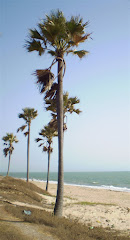On April 12 we did celebrate Easter here (if some of you were wondering), since my community is split Christian/Muslim, and I got to enjoy the visible harmony between the ethnicities that live here. Christians invited Muslim family and friends to spend the day at their houses, both religions went out on Saturday to take advantage of the holiday by dancing the night away at the local club, and many Muslims prepared a traditional sweet peanut butter/millet/baobab juice soup to be doled out to all of their Christian kin. I ended up spending the day at the nicest place in town, in fact, as my host mom happens to be the younger sister of the wife of the mayor. Lucky me! So I got dolled up along with my sisters and we enjoyed a delicious lunch and dinner there, just hanging out with family, despite my host family being Muslim and the mayor’s Christian. Here’s me and my sisters just before we went out for the day:

 The day after Easter was the last of school break, which had been going on for 2 weeks (Senegal observes Christian holidays in the school calendar because their first president was Christian). And then the very next day I hopped a car to Thies, as I had been asked to help out again with the newest group of Peace Corps trainees, this time for the few days of Counterpart Workshop.
The day after Easter was the last of school break, which had been going on for 2 weeks (Senegal observes Christian holidays in the school calendar because their first president was Christian). And then the very next day I hopped a car to Thies, as I had been asked to help out again with the newest group of Peace Corps trainees, this time for the few days of Counterpart Workshop.from my journal, Tuesday 4/14:
“Back in Thies to help with counterpart workshop, and I’m happy to feel valued here, for my year of experience, though I feel I left site today with hopes that a lot of good things will get started by the time I come back Saturday, and seriously doubt that most of it will in fact happen. If only it weren’t Earth Day next week, and if it hadn’t just been Easter break for the last two weeks…it’s just poor timing…”
But being in Thies was a good break, and I felt useful at counterpart workshop, being a go-between for the training staff, visiting work partners and the soon-to-be-volunteers.
And somehow I came back to site Saturday to find my teachers assembling a group of CM2 (like U.S. 6th grade) kids to start rehearsing a skit. Monday I easily convinced two other teachers to go with me to visit the chairman of the big market to ask permission to bring kids over to do a cleanup. We got him to agree to give us soap and bleach for hand-washing afterwards, and pay for gasoline to burn the piles of trash that the kids would rake together. By Tuesday the theater group was finding themselves costumes and a group of girls had a dance number ready. A list was compiled of one boy from each class who was going to fight in the wrestling match (lutte). And then Wednesday came, a day I’d been fretting about for at least a month, feeling like if I didn’t do something with my school for this one day that’s all about the environment, then I’d be a BAD environmental education volunteer.
And surprise: it wasn’t a disaster.

from my journal Thursday 4/23
“So. Yesterday was Earth Day. And a success!
The set-setal [cleanup] was fairly organized, kids brought brooms and rakes and the teachers supervised, we got eau de javel [bleach] and soap from Cheikh Diop at the marché and the kids washed their hands, the dance troupe performed (rather racily and scantily clad for some), the skit went on, and though getting cut off prematurely, was still mostly appreciated, and of course the lutte was the highlight. Director Diedhiou said a few closing words, and I financed the purchase of 150 0.5 liter sachets of water for the two CM2 classes who had cleaned up behind the marché. All in all, I’d call it a success. And I was the instigator! It all came together at the last minute, and though certainly there were things that could have been improved upon, I am happy with the way it all turned out. This was a major effort, and everyone at school really put their all into it, without asking for anything in return. I feel like I earned my pay this week! I did something visible, tangible, and I feel good about it. Now to settle down and work on lessons in the classroom…”
It turned out the timing was good after all, as Tuesday this week all the primary school teachers in the community started to strike.
That’s news from this side of the ocean. Here are a few pictures of Earth Day ’09, and I’ll post the whole lot on my Flickr photo page, so don’t forget to check it out!





